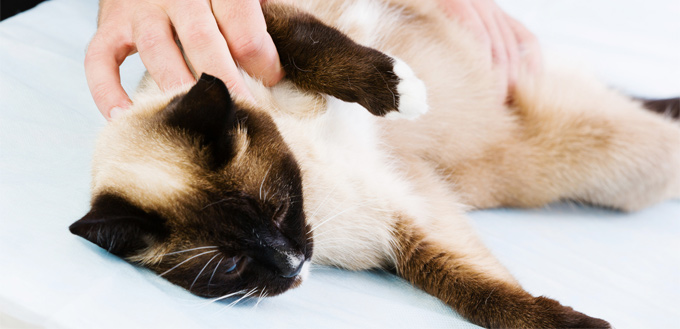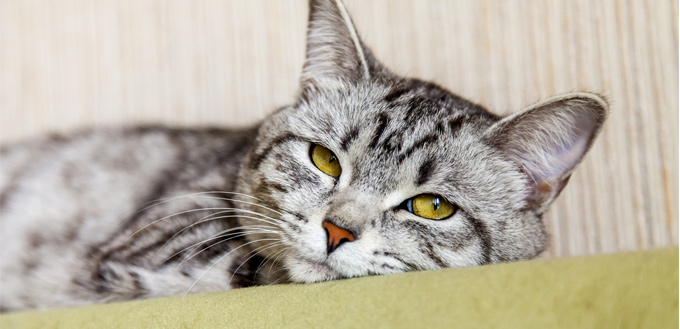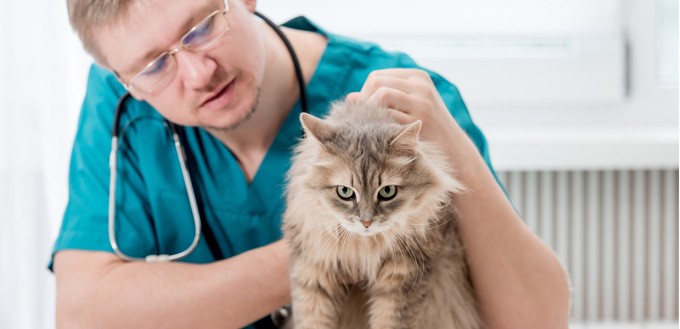Sneezing is a perfectly natural reflex action that enables us to eject something unwanted from our nasal cavity. This is just the same for cats – anything that causes irritation of the nerve endings inside your cat’s nasal passage can cause your cat to sneeze. This can include viruses, allergies and foreign objects like grass seeds. Some causes are relatively minor and some are more serious and they are all treated in different ways, so if you notice your cat sneezing, you should get them checked out by your vet.
Sometimes, when your cat sneezes, he may have some nasal discharge. This can affect one nostril or both and can begin suddenly or over a period of time. The nasal discharge is another sign of irritation inside the nasal passage. The nasal discharge can be clear, cloudy or blood-tinged. If you notice your cat sneezing, with a blood-tinged discharge, it can be alarming. Even more so, if the amount of blood is significant. As with any sneezing and nasal discharge, there can be many reasons why your cat may be sneezing blood. Your vet will carry out various tests and then discuss the treatment options and possible outcomes with you.
In this article, we take a look at the possible reasons your cat may be sneezing blood and what can be done to treat it.

Common Causes of Sneezing Blood
There are many possible causes of sneezing blood in cats, some more common than others. Sneezing blood is often associated with other symptoms which help to give a clue as to the cause. Some of the possible causes of sneezing blood include;
- Colds/flu: Sometimes, when a cat has a cold or flu, it can build up lots of nasal fluid inside its nasal passage which irritates the lining, resulting in sneezing blood. Your vet may suggest clearing your cat’s nose out before proceeding with further treatment to treat the underlying cold/flu. If your cat is displaying other cold/flu-like symptoms such as watery discharge from the eyes or nose, coughing or loss of appetite, alongside sneezing blood, it is likely that the cold is the cause. However, it is still important to get your cat checked at the vet to determine the cause of the cold/flu so that it can be treated appropriately.
- Allergies: Allergies can cause a similar build-up of fluids as a cold and can result in sneezing blood for the same reasons. If your cat began sneezing blood suddenly, it may be as a result of an allergy. If the sneezing began when you changed something in your cat’s environment, such as your cat’s litter or your household cleaning products, switching back again may be enough to stop it. If the sneezing appears seasonally, it may be an allergy to pollen or dust in the air and can be helped with treatment prescribed by your vet. A wide range of natural remedies can also help to relieve seasonal allergies.
- Dental problems: Occasionally, dental problems such as a tooth abscess can lead to infections which can spread to the nasal region and cause bloody sneezing. This is rare but should be considered if your cat is displaying any other dental symptoms, such as a change in appetite, or any pain around the jaw area. Regular health checks with your vet will help to identify any dental problems before they become serious. This is especially important with older cats.
- Foreign Body: Perhaps one of the most common causes of sneezing blood is a foreign body stuck in the cat’s nasal passage, such as a blade of grass or a piece of food. This may cause sneezing suddenly or it may begin more slowly as the foreign body moves. This may not present with any other symptoms, except perhaps some irritation.
- Trauma. Your cat may have suffered some trauma in or around its nose which has caused some bleeding inside the nasal passage. Your vet may ask some questions about your cat’s lifestyle, for example, if your cat fights with other cats and if your cat is an indoor or outdoor cat, to determine if trauma is a likely cause of the sneezing blood.
- Blood Problem: Sneezing blood can sometimes indicate a blood problem, such as anaemia, a clotting disorder or high blood pressure. If your cat also has blood in its faeces or is showing any other symptoms such as vomiting, lethargy or changes in appetite, it may indicate a blood problem, which can be serious. A blood problem may even be caused by rat poison. Rat poison works by deliberately causing a blood clotting problem so if your cat has possibly had access to rat poison or to affected rats, you should be extra cautious. Rodenticide poisoning can be fatal if not treated quickly.
- Tumour: If your cat has a tumour in or close to its nose, it may cause bloody sneezing. Depending on the location of the tumour you may not see any other symptoms except perhaps facial swelling if the tumour has reached a significant size.

Investigations to Determine Causes of Sneezing Blood
If your cat is sneezing blood you should get them checked by your vet as soon as possible. Hopefully, the cause of the sneezing blood will be one of the more common reasons and easily treated, but it is important to rule out anything more serious.
Cats rely heavily on their sense of smell and if nasal irritation hinders their sense of smell, they may stop eating which can cause further problems. Sneezing blood is uncomfortable and potentially painful for your cat and some of the possible causes can get worse if left untreated. It is therefore very important that if you notice your cat sneezing blood, you get them checked out by a vet as soon as possible.
Until you are able to get your cat to the vet, it is important that you keep him as relaxed as possible. If your cat is bleeding profusely, you may be able to stop some of the bleeding by holding an ice pack against your cat’s nose. However, if your cat becomes anxious or agitated, withdraw the ice pack as the most important thing is that he remains calm and relaxed.
Your vet will carry out a range of diagnostic tests to determine why your cat is sneezing blood in order to formulate the best treatment plan. These tests may include;
- A physical examination. The first thing most vets will do with any presenting complaint is a thorough physical examination of the pet. They will carry out a general health check to determine if your cat has any underlying health issues – they will listen to your cat’s heart and check his weight and body condition. The vet will also look closely at your cat’s nasal area for signs of a blockage, a tumour or a dental problem. They will look for physical evidence of trauma and will also note if your cat shows any pain.
- Diagnostic Imaging. Your vet may suggest diagnostic imaging. This may include radiography (x-ray), MRI or CT. These are all different types of imaging to look at the parts of your cat which can’t be seen externally. Most veterinary practices are able to perform radiography but if your vet feels a CT or MRI scan is necessary, they may need to arrange for you to be referred to a specialist veterinary hospital.
- Blood or Urine Testing. Your vet may take a blood and/or urine sample from your cat which can then be tested for a wide range of diseases. They will usually be able to test for some of the more common problems in-house but may need to send a sample to an external laboratory for more specific tests.
- Rhinoscopy. A rhinoscope is a long, thin instrument used to examine the inside of the nose. It has a light and a lens, transmitting pictures or a video back to a screen so that your vet can see what is happening inside the nasal passage. This will help your vet determine if there is any irritation, a foreign body or a tumour inside the nasal passage. This is a procedure which many vets are able to do, but some smaller practices may not have this equipment and may need to refer you elsewhere.
- Nasal Biopsy. The rhinoscope may have a tool on it which enables the vet to take a small sample from inside your cat’s nasal passage. This sample can then be sent to a laboratory for testing. This is most likely if your vet notices any changes to the lining of the nasal passage or any evidence of a tumour.

Treatments for Sneezing Blood
Once your vet has established the cause of the sneezing blood, they will discuss a treatment plan with you. The treatment for sneezing blood will depend on the cause and may include;
- Medication: If your cat is sneezing blood because of a cold or flu, your vet may prescribe antibiotics. If the sneezing is caused by an infection or a more serious blood problem, your vet may prescribe other medications which may cure, or in some cases, control the symptoms of the condition. If your cat is showing other symptoms they may require supportive treatments like intravenous fluids as well as medication to treat the underlying cause.
- Environmental or Lifestyle Changes: If your cat is sneezing blood because of an allergy, you may be able to help relieve the symptoms by making some changes to their environment. This may include changing your cat’s litter or your own household cleaning equipment or even your perfume! It may also include removing certain plants from your home and garden. If your cat goes outdoors, you may consider keeping him indoors at certain times of the day or year to help him avoid the triggers which cause the allergy. The important thing for allergies is trying to establish what your cat is allergic to in order to avoid these triggers.
- Home Remedies: Some home remedies can help to relieve the symptoms of allergies and colds, including dietary supplements, topical treatments and bathing.
- Surgery: If your cat’s sneezing blood is caused by a dental problem, a tumour or a foreign body, they may need surgery. Surgery for a dental problem is likely to include giving the teeth a thorough clean and removing any infected or badly damaged teeth. If your cat has a tumour, your vet may attempt to remove it surgically, however, once a nasal tumour has reached a certain size in a cat is sadly often too late to remove it successfully. If your cat has a foreign body stuck in its nose, your vet may use a range of methods to attempt to remove it, including with a rhinoscope, and ultimately surgery. Depending on the reason for surgery, your vet may also prescribe other treatments and medication before, during or after the surgery.

Related Post: Best Cat Litter
Conclusion
There are many possible causes of sneezing blood in cats and they can usually be treated effectively, however sneezing blood can also be an indication of a more serious problem. If you notice your cat sneezing blood, particularly if they are also showing other symptoms, you should get them checked over by your vet. Your vet will carry out a range of diagnostic tests and make a treatment plan accordingly.
Note: The advice provided in this post is intended for informational purposes and does not constitute medical advice regarding pets. For an accurate diagnosis of your pet's condition, please make an appointment with your vet.






